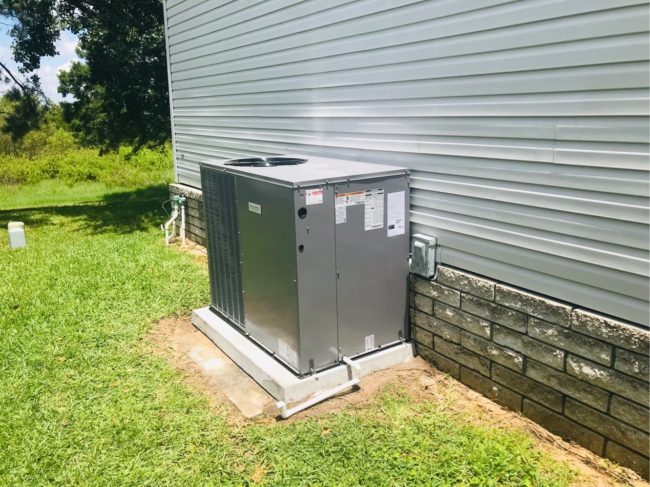
Based on a US Department of Energy study, American households spend a whopping $11 billion annually to power their air conditioning system. That’s a hefty bill to get cool air throughout the year. Your individual cost, however, doesn’t have to be high. By understanding what type of AC system best fits your home, you can avoid getting an AC unit that is overpowered for the job you need it to perform.
To help you find and install the right AC unit that fits your Jacksonville, FL, home, read on further as we discuss the different types of HVAC systems that exist and how they compare to each other.
Central AC
Perhaps the most common type of AC system that’s installed in the country is a central AC system. It is highly recommended for larger spaces due to its cooling efficiency. Central ACs distribute cool air via supply and return ducts. These ducts are typically installed in the walls or floors of your home and circulate the cool air around different spaces of the house. When the cool air starts to warm up again, the air is sucked back into the supply ducts and expelled out of your home. Installing a central AC unit often involves a ton of planning and preparation behind it as sizing both the space required for installation and the cooling capacity that’s ideal for the home are important. Central AC units are notorious for being high-energy consumers, which means you don’t want to be running an AC that’s too big for the house.
Ductless AC
A ductless, mini-split AC unit is often found in parts of the house that have been renovated. Similar to a central AC unit, a ductless system is made up of two main components – an interior handling unit and an exterior condenser unit. If you’re simply looking to regulate temperatures in specific parts of your home, a ductless AC unit may be the more cost-effective solution for you. Most ductless AC units allow for up to four interior handling units that are all linked to a single exterior condenser unit. Each room or space will have a separate thermostat so you can adjust individual room temperatures based on your needs. A potential disadvantage of ductless, mini-split AC units is that the interior handling unit is often wall-mounted, so it can be an eye-sore from an aesthetics perspective.
Window AC
Window ACs are usually picked for their compactness, but their ability to cool spaces is somewhat limited. Window AC units must be installed or mounted on the window of a room, which can sometimes be challenging for windows that were not designed to accommodate an air conditioning unit. Window AC units regulate temperature by expelling the warm air out through the back of the machine and then, simultaneously, producing cool air in. This type of AC is often used for smaller living spaces, such as studios or one-bedroom apartments in the city. Installing a window AC can be tricky as you need both a window that’s built for AC mounting and that is close enough to a suitable power outlet. Running it can also create noise pollution that’s audible from the inside.
Portable AC
As the name implies, a portable air conditioner can be installed and set up anywhere in your home. This type of HVAC system is commonly referred to as the next generation of window units. Portable air conditioning units are designed to work in a single room or space, which is why they are very common in urban dwellings where the average square footage of apartments and condo units is relatively small. But what they lack in cooling capacity, they make up for in ease of installation and versatility. It’s also an affordable cooling solution for those on a tight budget.
Hybrid AC
Similar to hybrid vehicles, a hybrid AC unit switches between two energy sources to operate. A hybrid AC can switch between traditional fossil fuel and electricity in order to be energy efficient. A hybrid heat pump works as any standard heat pump system. It sucks the warm air out of your home while distributing cool air indoors.
Geothermal HVAC System
HVAC systems that run on geothermal energy are more sustainable and power efficient. Because ground temperatures below your home remain fairly consistent, regardless of the atmospheric temperature above, geothermal HVAC systems are able to draw the heat from the ground and then transfer it into your home and vice versa. The availability of this HVAC option depends on your location as installing it requires loops that run four to six feet deep into the ground. Installation costs can also be steep. That said, geothermal AC units typically last longer than any other type of HVAC system available on the market.
Floor-Mounted AC
A floor-mounted AC unit is designed for convenient installation and for homes that lack the space necessary for a bulky wall-mounted air conditioner. The interior handling unit of a floor-mounted AC sits on the floor while the exterior portion of the AC is installed fairly simply without the need for site preparation or ductwork. Floor-mounted air conditioners generally work well for rooms that have slanted walls, including attics or older structures constructed with glass. One added advantage of a floor-mounted AC unit is that you can easily check the air filters’ conditions for convenient cleaning or replacement. It’s also installed in an easily accessible spot of the home, making it a good HVAC system for elderly people.
Smart AC
Smart AC systems are becoming increasingly popular in today’s tech-driven age. A smart AC unit can encompass other traditional types of AC, such as ductless or window units. The only key difference is that a smart AC is IoT-enabled, meaning that it’s linked to your home’s network and comes with a native mobile application that you can use to control your AC from anywhere and at any time. Depending on the brand that you go for, a smart AC can come packed with a variety of useful features, including geofencing, weekly scheduling, and various temperature modes. Perhaps a potential deterrent that would stop you from buying a smart AC is cost. However, keep in mind that the relatively higher upfront costs of a smart AC unit are gradually offset by the energy savings you get from it over time.
Choosing the right type of AC system for your home is a big decision that merits consideration of all relevant factors, including cost, available space, cooling capacity needs, and ease of maintenance. Although researching an AC might not seem like an exciting way to spend your weekend, choosing the right AC unit can save you thousands of dollars.
Our experienced, licensed, and insured HVAC technicians in Jacksonville, FL, can help you figure out which type of air conditioning system best fits your specific needs and circumstances. Contact McGowan's Heating & Air Conditioning today to learn more about our products and services! We offer heating, cooling, attic insulation, and indoor air quality services.



